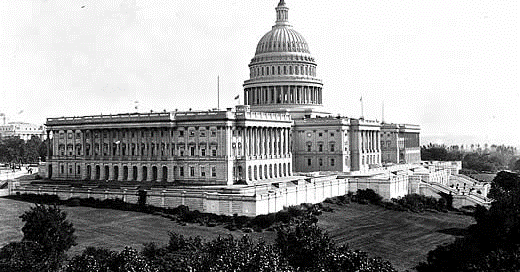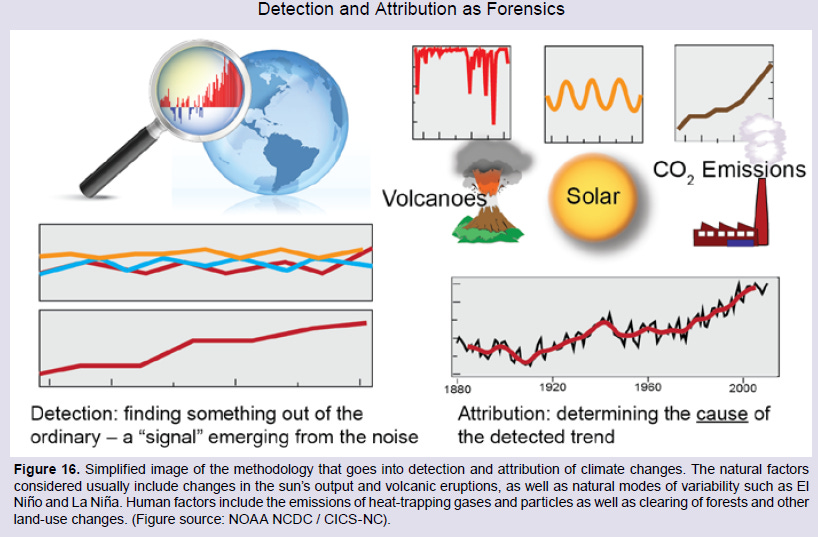On Wednesday, I’ll be testifying before the Senate Committee on the Budget in a hearing titled, “Droughts, Dollars, and Decisions: Water Scarcity in a Changing Climate.” My testimony is embargoed until then, but after the hearing, I will post my oral and written testimony here and I will be happy to engage questions and comments.
I have been invited by the minority (Republicans) and asked to summarize for the committee the findings of the Intergovernmental Panel on Climate Change (IPCC) on drought. The first time I testified before the Senate, in 2002, I was invited by Democrats and I was similarly asked to summarize the findings of the IPCC on extreme events.
That has me thinking about how the views of the IPCC, Democrats, and Republicans1 (and my own views as well) may have changed over the past several decades on the science of climate change — and on extreme weather and climate events specifically.
As I will relate in my testimony on Wednesday, the IPCC (Working Group 1) has been remarkably consistent in its periodic assessment reports in its findings on the detection and attribution of trends in extreme events. My research with many colleagues over decades has often been cited in those assessments, and — looking back at my past peer-reviewed studies, commentaries, and testimonies — my views have developed over time but also stayed highly consistent and also consistent with the findings of the IPCC.
Thus, the fact that Democrats used to invite me to testify about the IPCC and now Republicans do cannot be explained by a change in the findings of the IPCC or a rethinking of my own perspectives.
Instead, it’s my observation and experience that the views of the political parties on the assessments of the IPCC has shifted dramatically over the past several decades.2 The schematic below shows my impression of how things looked in 2002, when I first testified before Congress. At that time, Democrats, for the most part, had views on climate change and extreme events largely in line with the findings of the IPCC. I’d venture that this is why I was invited by Democrats at the time to testify.3
Flash forward to 2024. Much more research has been published and three further IPCC assessments have been produced. Over this time, the IPCC’s bottom-line findings on climate and extreme events have become better supported with evidence and research.
In 2024, here is how I see views of the assessments of the IPCC in the current U.S. Congress.
Democrats — not all, but many — have left the IPCC behind in favor of an extreme view of climate and extreme events. Republicans — not all, but many — find themselves much more in line with the findings of the IPCC on climate and extreme events. Similarly, I’d guess that explains why in recent years I’ve been invited to testify by Republicans.4
Of course, consistency with the IPCC (or not) says little about policy preferences. Democrats remain the party championing action on climate policy and Republicans remain much less supportive. Of course, the key question here is, What action? I have long argued that there are unexplored opportunities for greater bipartisan support for pragmatic energy and adaptation policies that would accelerate decarbonization and reduce vulnerabilities — but that’s a topic for another day.
Policy aside, with respect to the IPCC and climate science, Democrats are currently the party of RCP8.5 and “billion dollar disasters,” while many Republicans express views much more in line with the findings of the IPCC.5
One consequence of this shift in perspective is that some climate activists have sought to delegitimize the IPCC. For instance, Naomi Oreskes has called for the IPCC Working Group 1 to be shut down:
One step that could help that happen would be for the IPCC to declare the job of WG1 to be done and close it down.
After all, if human-made warming is as unequivocal as these scientists insist, then why do we need more reports to tell us the same thing?
Others argue that the IPCC has been corrupted by “contrarians”:
. . . contrarian views against anthropogenic climate disruption can lobby the scientific community, and the IPCC in particular, to be conservative and so reinforce contrarian views in a vicious, self-reinforcing circle
The battle for the soul of the IPCC has really only just begun — just wait for the coming battle over letting go of extreme, implausible scenarios.
The science of detection and attribution of extreme events under the IPCC’s longstanding framework can only change very slowly, as the additions to the observational record accumulate slowly as time passes, even under the seemingly glacial pace of IPCC assessments.6 In other words, five years more data on hurricanes, floods, drought, and so on will not alter the fundamental conclusions of the IPCC Working Group 1 on its assessment of long-term trends. At the same time, understandings that the extreme scenario once characterized as “business as usual” is now implausible means that projections of future trends will necessarily be less extreme.
Given these realities, I expect to see more attacks on the IPCC and mainstream climate science by climate activists, including those within the scientific community.
Consider the case of the U.S. National Climate Assessment, which I have argued has been fully taken over by climate activists. In 2014, the Third U.S. National Climate Assessment highlighted the importance of the IPCC’s framework for detection and attribution. The figure below comes from that report.
Similarly, in 2017, the Fourth U.S. National Climate Assessment (NCA) included a chapter on the detection and attribution of trends in extreme events, following the framework of the IPCC, explaining:
Detection and attribution studies are important for a number of reasons. For example, such studies can help determine whether a human influence on climate variables (for example, temperature) can be distinguished from natural variability. Detection and attribution studies can help evaluate whether model simulations are consistent with observed trends or other changes in the climate system. Results from detection and attribution studies can inform decision making on climate policy and adaptation.
However, in 2023, the authors of the Fifth U.S. NCA decided — amazingly — to eliminate its chapter on the detection and attribution of trends in extreme events and the IPCC framework, and instead to emphasize billion dollar disasters as an indicator of changes in extreme events.7
The number and cost of weather-related disasters have increased dramatically over the past four decades, in part due to the increasing frequency and severity of extreme events and in part due to increases in exposure and vulnerability. In 2022 alone, the United States experienced 18 weather and climate disasters with damages exceeding $1 billion (Figures 2.6, A4.5). There is increasing confidence that changes in some extreme events are driven by human-caused climate change (KM 3.5).
Though it hasn’t been much discussed (probably due to its poor quality), the Fifth U.S. NCA rejected the scientific framework of the IPCC. This should not be a surprise — I’ve long argued that the placement of the U.S. NCA in the Executive Office of the President makes it a tempting target for political meddling, by Republican and Democratic administrations. Thus, the 2023 U.S. NCA represents the current Democratic view of climate science that disfavors the IPCC.
Over recent decades, both Democrats and Republicans have shifted in their views of the IPCC. Given this shifting landscape, leaders of the IPCC and the broader scientific community should prioritize steps to ensure the institutional integrity of its Working Group 1, so that it can continue to effectively assess the science of climate change, regardless which elected officials cite their work.
Thanks for reading! I welcome comments, critique, and discussion. THB has a great comment tradition — let’s all work to keep it that way! THB is reader supported. That means that your subscriptions help make it possible for me not only to oversee THB, but also to participate in policy discussions such as this week’s hearing. Thank you!
Further reading;
On Wednesday you can watch the Senate hearing live at 10:30AM ET at this link and download my testimony and the other four witnesses as well.
Here is a link to my Senate testimony from last July on RCP8.5.
A post on the most recent U.S. National Climate Assessment.
In 2020, I offered some thoughts on how to fix the U.S. NCA.
Paid subscribers can download PDFs of my books — Disasters and Climate Change & The Climate Fix — where I discuss the IPCC frame work for detection and attribution in some depth.
U.S. politics are weird right now. The Democrats can claim to have a more or less coherent political party, even if under a big tent. The Republicans, in contrast, are really two political parties that share tent space — MAGA/Trump and more conventional conservatives. The latter has mostly hitched its fortunes to the former for reasons of expediency because at present MAGA dominates the presidential race, and not because of any ideological affinity. In fact, I don’t think that MAGA/Trump Republicans have well-formed political or policy views, on climate, IPCC, or anything else — it is in my view a cult of personality. So when I refer to “Republicans” in this post, I am not referring to the MAGA/Trump wing, but the conventional political party that may or may not survive the party’s current schism. Perhaps I’ll devote a post to this in the future.
This would make for a great empirical study.
See my post on experts and congressional testimony. There I explained, “A specific expert is asked to testify because policy makers see some political advantage in having that expert testify. Academics unaffiliated with government, advocacy groups, or formal scientific assessments should quickly disabuse themselves of any notion that they have been invited to "speak truth to power." Rather, they are carefully selected for the perceived political benefits of their testimony.”
Full disclosure — I’ve been a registered Independent in the state of Colorado since 1986. I will accept any invitation to testify before Congress in my areas of expertise regardless of who invites me. It is a privilege to be invited by Democrats or Republicans. There are wonderful, hard-working people in Congress, on their staffs, and across the United States in both parties. We Independents aren’t half bad either.
One day soon, I hope that congressional Democrats take a hard look at how their views on topics like a COVID-19 lab leak and “billion dollar disasters” departed so far from mainstream science.
I’ve argued that one reason for the creation of so-called “event attribution” studies is that the IPCC’s framework for detection and attribution has not delivered results desired by climate activists.
See my in-press paper on “billion dollar disasters,” expect a post on that very soon.








The IPCC's treatment of your research regarding damage and GDP, which you documented here at THB, does not speak well of its scientific integrity.
Good luck with testifying. I am looking forward to your testimony.